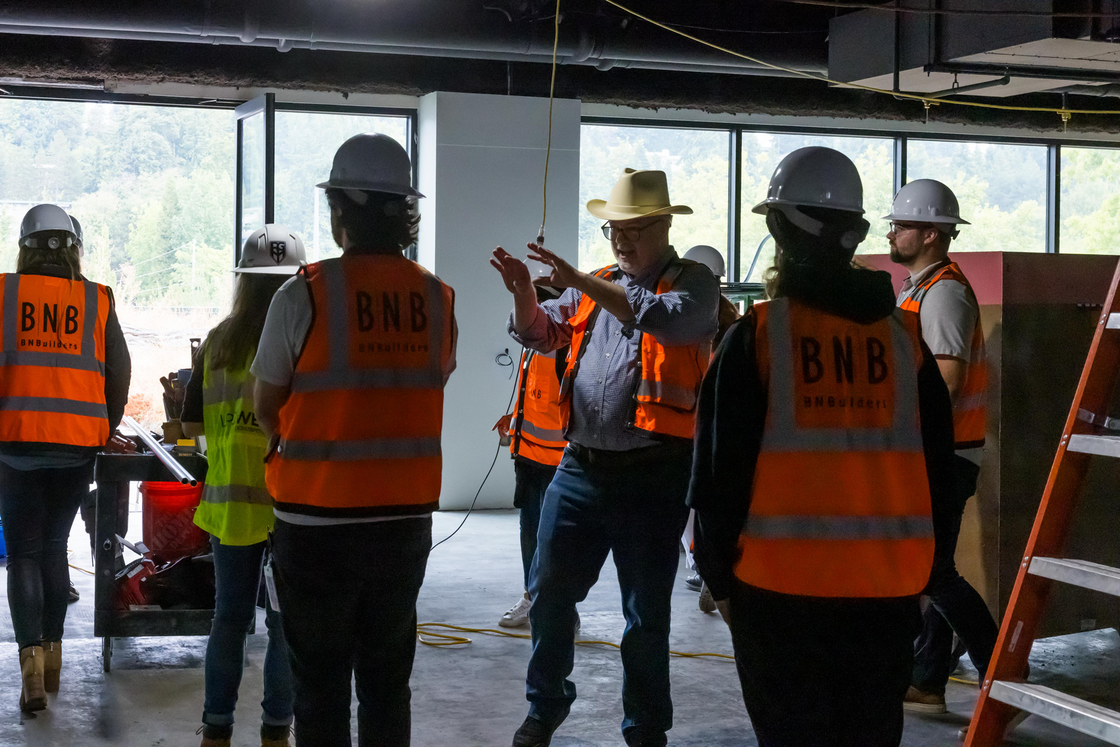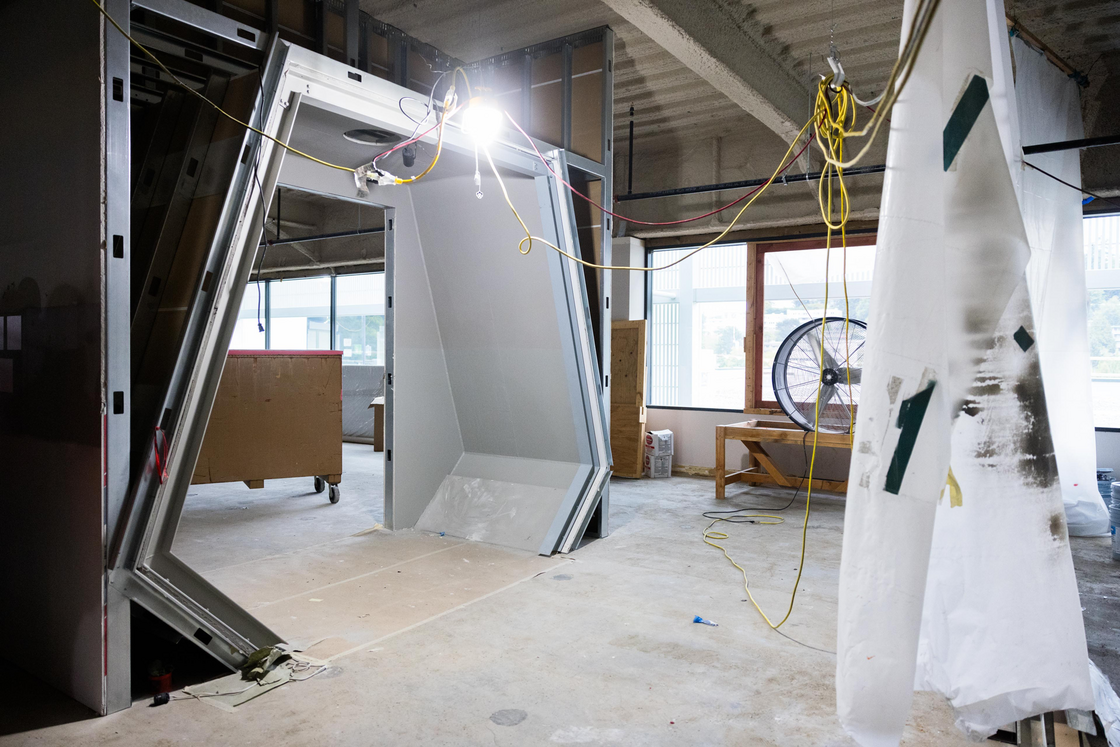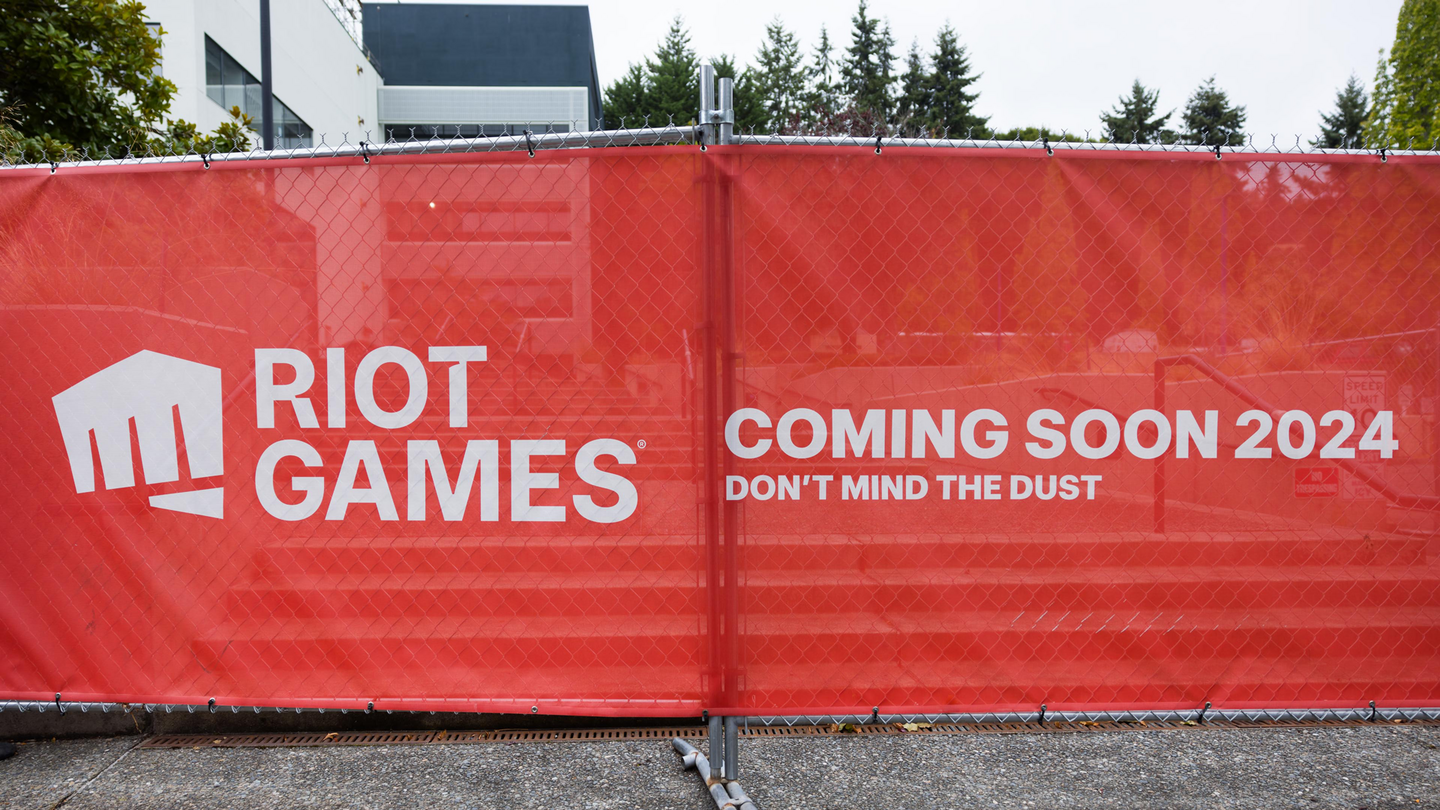A Central Location That Can be Wholly Riot
Set against a lush, green Pacific Northwest backdrop is a construction site buzzing with activity from workers in hard hats welding, painting, and collaborating on every floor. Right now, it’s an office space in progress. Soon it will be Riot’s home in Seattle.
“Seattle is the birthplace of Microsoft and Xbox, it’s where Nintendo had their first US headquarters, it’s where Valve and Bungie create some of the most innovative and beloved games in the world,” said Deke Waters, VP of Operations for VALORANT Studio. “Gaming is important to Seattle and there are tons of talented gaming professionals here for sure. Plus, with the size and scope of our live games like League and VALORANT, our needs overlap with some of the largest companies in the world who also call Seattle home. While we always look for the best game devs, Seattle has a strong cross-section of talent across different industries that will help Riot serve players in a variety of ways.”
For a few years now, Deke has been part of a steadily growing contingent of Rioters based in Bellevue. With the launch of VALORANT and the additional devs needed to support the evolving game, the time is right to move out of that temporary office and into an official home on Mercer Island—located about halfway between Seattle and Bellevue.
“We chose Mercer Island because it's centrally located but also because it’s a unique place for an office,” said Joseph Donaldson, Riot’s Principal on the Construction and Real Estate Team. “You’re not buried in an office park with five other companies here, your backyard is hiking trails and the design can be wholly Riot.”
While the larger Seattle metropolitan area is no stranger to the office spaces of some of the world’s most recognizable companies, Mercer Island might not be everyone’s first choice for a company's office location. We chose to make it our home base for a few reasons, but chief among them was Mercer Island’s location in relation to the Greater Seattle Area. The talent in Seattle stretches from Puget Sound to Mt. Rainier so we wanted the office to be accessible for people living everywhere from Redmond to SeaTac.
“Most gamers know about the Microsoft’s and Valve’s but some may not know about all the incredible indie developers based in Seattle as well,” Deke said. “Some games that have taken the world by storm like Niantic’s Pokemon Go, InnerSloth’s Among Us, and MegaCrit’s Slay the Spire were all developed in Seattle. There’s a super vibrant gaming community here.”
When it comes to making games, Seattle’s track record stands out as one of the most impactful cities in gaming history. While we already have hundreds of Rioters based out of the city, Mercer Island will be a new chapter in our part of the city's robust gaming culture. As we welcome in Rioters from around the Seattle area, we are also making sure the Mercer Island community we now call neighbors are our partners in this new chapter.
“We are centralized here in a great Mercer Island community where we are already the second-largest employer on the island,” said Craig Hooker, Riot’s Workplace Experience Supervisor for the Pacific Northwest. “We’re really excited to work with this community. We’re already in talks with the local farmers market which happens at the park next door to the office, the Mercer Island school district, and other parts of the community to make sure that Riot helps support this community we are now part of.”

Lessons Learned in Riot Design Over the Years
Riot was founded in 2006 and League of Legends launched in 2009. By 2010, there were two offices, one in Los Angeles and the other in St. Louis. Over the past decade, Riot has gone global with more than 4,500 employees spread across nearly 30 offices. Throughout that growth, Joseph and the entire team have worked on offices big and small while taking learnings away after every completed project.
“We have a really deep bench of experts on these projects,” Craig said. “A lot of the people have been designing Riot offices for years and they’ve learned a lot of lessons over that time. Some things we’ve gotten right, and many things we’ve gotten wrong, but you ultimately learn more from mistakes. I think what we have at Mercer Island is a great opportunity to combine all of the lessons learned building the Los Angeles HQ and all the offices around the world to really deliver the best quality space for Rioters.”
While the team has learned plenty of lessons over that time, there’s one word that’s always top of mind when they work on a new project: flexibility.
“When I’m working with architects on a plan, one of the first things I say is, ‘Oh, this is cool, how can I change it?’” Joseph laughed. “The architect will say ‘Oh, you don’t like it?’ But it’s not that I don’t like it, it’s that I do, but I also recognize that the time will come where we are going to need to change it or repurpose it. I’ve been working in the games business for nearly 30 years and it always feels like once I build a wall, that wall is in the wrong place. I build a room and it's the wrong size. So when working on the Los Angeles HQ, we just put everything on casters. The dividers, the desks, they are all moveable. Then when Covid hit and team sizes shifted and remote work became a core part of the day-to-day, we were able to adjust on the fly.”
But flexibility isn’t just for growth. Flexibility can be the needs of one game team compared to another, the flexibility of the age of remote work, or the flexibility needed in the day-to-day moments of a dynamic campus.
It’s no secret that workplace culture has evolved over the last few years. Companies big and small have had to shift how they work and find new solutions. For the team in Seattle, remote collaboration was always going to be a key focus as they work directly with teams in Los Angeles and around the world to develop games in tandem.
“VALORANT has team members in Seattle, Sydney, Singapore, and Los Angeles,” Deke said. “Having a dispersed dev team means we have to be intentional about how we work. Riot has heavily invested in state of the art video / audio for meeting rooms, we’ve learned how to better use async and online tools to navigate locations and time zones. Each Rioter is able to have the same workplace experience no matter what office they are in, including the one in their home. But there’s also no way to fully replace getting in a room together and collaborating in-person so we budget in time to have those in-person moments.”
The team working on Mercer Island has to think through all the ways the office will be used, from big in-person rituals to the day-to-day digital collaboration.
“We ask ourselves, what is the reason you’re coming in?” Craig explained. “You’re coming in for a specific need like big team collaboration, experiencing an on-campus event, or designing something together. That’s where the flexibility comes in. We want to make sure our office can be designed for Rioters from day one but also changed to match how Rioters end up using the office once they’re settled in. The question is how can we make the office work for them?”
The Design is in the Details
As the team enters the home stretch of construction, they don’t want to spoil any details of the overall theme just yet. It's safe to say there will be hidden surprises, unique designs, and plenty of choices that connect this office to the games that will be worked on inside its walls.
When the office officially opens in early 2024, they want every Rioter to experience the new space for themselves. From Los Angeles’s Bilgewater Brew to Mexico City’s neon corridors to Singapore’s futuristic cafeteria, each Riot office has its own unique flair. While Seattle’s theme is still under wraps, it’s one of the most ambitious and downright radiant office concepts yet.
“One thing that’s really important for us is that when you walk into a Riot office you can tell that it’s a Riot space,” Craig said. “We have some core architectural features that are going to tie this space to Riot’s games and make it feel like a unique and inspiring place to work.”
While the theming is core to the concept and design, it’s just one part of what the team is focused on. While unique features are fun, it’s the myriad of smaller details that really impact the working experience. The team has to consider the hundreds of individual choices that go into things like lighting, sound, collaboration, tools, temperature controls, and so much more.
“It’s so important to really think through the environment that people will be experiencing and how game developers use an office space,” Joseph said. “For example, when we did central campus in Los Angeles, I remember talking through the lighting. I said I want to do all up lighting to create an ambient light effect. Almost every other office space would require some downlighting for tasks. But I’ve gone into a bunch of game and tech companies and, in the areas where people are working, they work with the lights fully off because down lighting creates screen glare if there aren’t enough controls.”

That detail extends to the additional padding in the walls to prevent sound from traveling, to the complex but hidden electrical system, and to the air system which has to serve both underground rooms and a restaurant on the top floor. As the office gets closer to opening, be on the lookout for a proper tour of all the hidden details and unique designs the office has to offer.
“Thanks to our Workplace Experience, Facilities, and IT teams at Riot, our offices are amazing places to work and play together,” Deke said. “We have the bases covered for work but there are also intentional places for socializing and gaming. The new Seattle office is a shining example. In addition to plenty of room for dedicated and shared desks, we have open social areas, 1-on-1 nooks, playtest rooms, theater rooms, and so much more.”
As Riot continues to expand the way we build games around the globe, the new building on Mercer Island will be a core part of where new concepts are conceived, characters are created, and worlds continue to expand, as game devs get to do what they do best.
